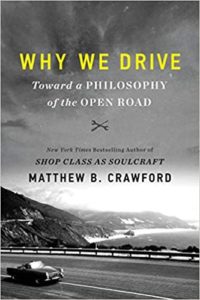Have you been dreaming of driverless cars like EconTalk host Russ Roberts? Well, author Matthew Crawford might turn your dreams into nightmares. Crawford joins Roberts in this episode to discuss his book, Why We Drive: Toward a Philosophy of the Open Road. Crawford is a devotee of serendipity, and finds the open road- (NO Waze or Google maps, thank you very much) an ideal place to find it.
It turns out Crawford’s book is about more than just driving cars. A lot more. So let’s hear what you have to say. Use the prompts below to continue to conversation- either on or offline. Just not while you’re driving, please.

1- What does Crawford mean when he suggests that technology such as driverless cars will likely undermine our capacity for self-governance à la Tocqueville and lead to “a supervisory technocratic regime?”
2- Are children fundamentally conservative, as Roberts suggests? Would you call Crawford a conservative? (He mentions an Oakeshott “brand” of conservatism.) How about Roberts? What about you?
3- Roberts presses Crawford on our apparent need to push ourselves against our physical limits. How does Crawford defend that level of risk-taking? To what extent do you agree? Consider his contention (based on the work of Johan Huizinga) that we’ve eliminated too much “play” (and thereby competition) from the human experience? Is this true? If so, what should we do about it?
4- What are the bases of Crawford’s concerns about Big Tech? How does he suggest Big Tech is utilizing “choice architecture,” and why is this necessarily political? Is a “full-blown technocratic paternalism” as imminent as Crawford seems to believe?
5- Roberts describes the happiness he experiences when he lands in a new city, powers up his phone, and gets a notification about the best coffee shops in the area. Crawford retorts that while this example is relatively benign, it is “still a fundamentally different way of inhabiting the world.” How so? Again, to what extent should this worry you?


READER COMMENTS
Cobey Williamson
Jan 17 2021 at 12:01pm
Our addiction to the automobile will be the undoing of our nation.
https://www.inkitt.com/stories/drama/458810
John Alcorn
Jan 17 2021 at 8:21pm
1. The software of driverless cars tracks passenger data, which can be used for surveillance, preemptive preference satisfaction (‘anticipation is the essence of service’), and even manipulation or control.
2. Political labels are reductive. The more a political term requires definition, the less useful it is.
3. Crawford is more the economist here. Individual risk preferences (and also time preferences) are subjective. They are neither rational nor irrational, as long as they are clear-eyed and internally consistent. Interesting macro questions arise about economic consequences of particular mixes or ranges of risk preferences (or of time preferences) in a population.
4. It’s happening now!
5. Careful, frequent introspection persuades me that advertising and unsolicited marketing almost never play a causal role in my consumer behavior. Moreover, perhaps surprisingly, Google, Amazon, and online advertisers (and even Netflix and Hulu) still don’t come at all close to figuring out or anticipating my preferences. IMO Big Tech insight is way overrated, and Big Tech intrusion (and now paternalism and censorship) is a serious problem.
Amy Willis
Jan 18 2021 at 10:56am
@John, care to offer any examples for #4?
And what do you mean by censorship? Can private companies really censor?
John Alcorn
Jan 18 2021 at 1:33pm
@Amy,
I follow the everyday meaning of the word, as defined in the Wikipedia article, “Censorship“:
An example I have in mind is Big Tech’s censorship of Parler. Big Tech firms converged on complementary policies (a) to remove Parler from app stores for Apple and Android (i.e., to block demand) and (b) to unplug Parler from servers (i.e., to block necessary inputs on the supply side). For specifics and economic analysis, see Casey Mulligan’s blogposts here (11 January 2021) and here (13 January 2021).
Comments are closed.